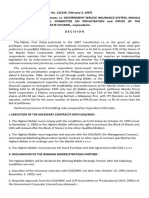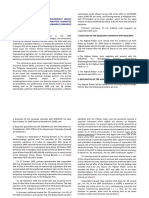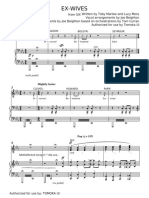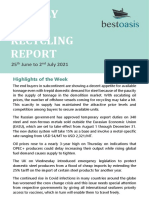Manila Prince Hotel V
Manila Prince Hotel V
Uploaded by
Leizl Aldave VillapandoCopyright:
Available Formats
Manila Prince Hotel V
Manila Prince Hotel V
Uploaded by
Leizl Aldave VillapandoOriginal Description:
Copyright
Available Formats
Share this document
Did you find this document useful?
Is this content inappropriate?
Copyright:
Available Formats
Manila Prince Hotel V
Manila Prince Hotel V
Uploaded by
Leizl Aldave VillapandoCopyright:
Available Formats
Manila Prince Hotel v.
GSIS (1997) sacredness of independence and its power and capacity to
The FiIipino First Policy enshrined in the 1987 release the full potential of the Filipino people. To all intents
Constitution, i.e., in the grant of rights, privileges, and and purposes, it has become a part of the national
concessions covering the national economy and patrimony, patrimony.6 Petitioner also argues that since 51% of the
the State shall give preference to qualified Filipinos,1 is in shares of the MHC carries with it the ownership of the
oked by petitioner in its bid to acquire 51% of the shares of business of the hotel which is owned by respondent GSIS, a
the Manila Hotel Corporation (MHC) which owns the historic government-owned and controlled corporation, the hotel
Manila Hotel. Opposing, respondents maintain that the business of respondent GSIS being a part of the tourism
provision is not self-executing but requires an implementing industry is unquestionably a part of the national economy.
legislation for its enforcement. Corollarily, they ask whether Thus, any transaction involving 51% of the shares of stock of
the 51% shares form part of the national economy and the MHC is clearly covered by the term national economy, to
patrimony covered by the protective mantle of the which Sec. 10, second par., Art. XII, 1987 Constitution,
Constitution. applies.
Facts: The controversy arose when respondent Government It is also the thesis of petitioner that since Manila Hotel is
Service Insurance System (GSIS), pursuant to the privatization part of the national patrimony and its business also
program of the Philippine Government under Proclamation unquestionably part of the national economy petitioner
No. 50 dated 8 December 1986, decided to sell through public should be preferred after it has matched the bid offer of the
bidding 30% to 51% of the issued and outstanding shares of Malaysian firm. For the bidding rules mandate that if for any
respondent MHC. The winning bidder, or the eventual reason, the Highest Bidder cannot be awarded the Block of
"strategic partner," is to provide management expertise Shares, GSIS may offer this to the other Qualified Bidders that
and/or an international marketing/reservation system, and have validly submitted bids provided that these Qualified
financial support to strengthen the profitability and Bidders are willing to match the highest bid in terms of price
performance of the Manila Hotel. In a close bidding held on per share.
18 September 1995 only 2 bidders participated: petitioner
Manila Prince Hotel Corporation, a Filipino corporation, Respondents except. They maintain that: First, Sec. 10,
which offered to buy 51% of the MHC or 15,300,000 shares at second par., Art. XII, of the 1987 Constitution is merely a
P41.58 per share, and Renong Berhad, a Malaysian firm, statement of principle and policy since it is not a self-
with ITT-Sheraton as its hotel operator, which bid for the executing provision and requires implementing legislation(s) .
same number of shares at P44.00 per share, or P2.42 more . . Thus, for the said provision to Operate, there must be
than the bid of petitioner. existing laws "to lay down conditions under which business
may be done.
Pending the declaration of Renong Berhad as the winning
bidder/strategic partner and the execution of the necessary
contracts, petitioner in a letter to respondent GSIS dated 28
September 1995 matched the bid price of P44.00 per share
tendered by Renong Berhad.4 In a subsequent letter dated 10
October 1995 petitioner sent a manager's check issued by
Philtrust Bank for Thirty-three Million Pesos (P33.000.000.00)
as Bid Security to match the bid of the Malaysian Group,
Messrs. Renong Berhad . . . which respondent GSIS refused to
accept.
On 17 October 1995, perhaps apprehensive that respondent
GSIS has disregarded the tender of the matching bid and that
the sale of 51% of the MHC may be hastened by respondent
GSIS and consummated with Renong Berhad, petitioner came
to this Court on prohibition and mandamus. On 18 October
1995 the Court issued a temporary restraining order
enjoining respondents from perfecting and consummating
the sale to the Malaysian firm.
In the main, petitioner invokes Sec. 10, second par., Art. XII,
of the 1987 Constitution and submits that the Manila Hotel
has been identified with the Filipino nation and has practically
become a historical monument which reflects the vibrancy of
Philippine heritage and culture. It is a proud legacy of an
earlier generation of Filipinos who believed in the nobility and
You might also like
- ZM Capitals Academy: Where Trading Is MadeDocument33 pagesZM Capitals Academy: Where Trading Is MadeStephane Marchands100% (21)
- VILLAPANDO, LEIZL A. Remedial Law - BAR QUESTIONS AND ANSWERS.1&2Document2 pagesVILLAPANDO, LEIZL A. Remedial Law - BAR QUESTIONS AND ANSWERS.1&2Leizl Aldave Villapando67% (6)
- Accounting Explained To Kids (Free Ebook)Document32 pagesAccounting Explained To Kids (Free Ebook)Evandro Machado100% (1)
- KSB Megaflow V: Pumps For Sewage, Effuents and MisturesDocument18 pagesKSB Megaflow V: Pumps For Sewage, Effuents and MisturesKorneliusNo ratings yet
- Hvac BomDocument6 pagesHvac BomTagel MarkosNo ratings yet
- Case Digest - Manila Prince Hotel Vs GSISDocument3 pagesCase Digest - Manila Prince Hotel Vs GSISChristian Prince SeverinoNo ratings yet
- Manila Prince Hotel V GSISDocument24 pagesManila Prince Hotel V GSIS'mhariie-mhAriie TOotNo ratings yet
- 2Document759 pages2Anton ArponNo ratings yet
- Principle and State Policies CasesDocument290 pagesPrinciple and State Policies Casesmerwin cruzNo ratings yet
- Manila Prince Hotel Vs GSIS 1997Document11 pagesManila Prince Hotel Vs GSIS 1997Lemuel AtupNo ratings yet
- Manila Prince Hotel Vs GSIS DigestDocument2 pagesManila Prince Hotel Vs GSIS DigestRosette G. ReynoNo ratings yet
- Consti Cases Manila PrinceDocument45 pagesConsti Cases Manila Princeagong lodgeNo ratings yet
- CasesDocument1,189 pagesCasesneri roseNo ratings yet
- Manila Prince Hotel - DisiniVsSoJDocument194 pagesManila Prince Hotel - DisiniVsSoJkbongcoNo ratings yet
- Manila Prince vs. GSISDocument14 pagesManila Prince vs. GSISChristianVillanuevaNo ratings yet
- Manila Prince Hotel vs. GSISDocument47 pagesManila Prince Hotel vs. GSISCoco PimentelNo ratings yet
- Manila Prince Hotel v. GSIS (GR 122156 3 February 3, 1997)Document13 pagesManila Prince Hotel v. GSIS (GR 122156 3 February 3, 1997)Cari Mangalindan MacaalayNo ratings yet
- Consti004 PDFDocument14 pagesConsti004 PDForeo000No ratings yet
- Prince Hotel Vs Gs IsDocument7 pagesPrince Hotel Vs Gs IsJu LanNo ratings yet
- Manila PrinceDocument16 pagesManila PrinceCris Margot LuyabenNo ratings yet
- Supreme CourtDocument97 pagesSupreme CourtJannina Pinson RanceNo ratings yet
- MANILA PRINCE HOTEL v. GOVERNMENT SERVICE INSURANCE SYSTEMDocument24 pagesMANILA PRINCE HOTEL v. GOVERNMENT SERVICE INSURANCE SYSTEMEdgar Calzita AlotaNo ratings yet
- Manila Prince Hotel vs. GsisDocument37 pagesManila Prince Hotel vs. GsisSugar Fructose GalactoseNo ratings yet
- Manila Prince Hotel v. GSISDocument11 pagesManila Prince Hotel v. GSISJan Michael LorenzoNo ratings yet
- Constia CDocument253 pagesConstia CIsabelNo ratings yet
- Cases NATRES Batch1Document113 pagesCases NATRES Batch1Leo Mark LongcopNo ratings yet
- Economy and Patrimony, The State Shall Give Preference To Qualified FilipinosDocument76 pagesEconomy and Patrimony, The State Shall Give Preference To Qualified FilipinosClarisse30No ratings yet
- Concessions Covering The National Economy and Patrimony, The State Shall Give Preference To Qualified FilipinosDocument15 pagesConcessions Covering The National Economy and Patrimony, The State Shall Give Preference To Qualified FilipinosYe Seul DvngrcNo ratings yet
- Law CasesDocument174 pagesLaw CasesAnonymous NqaBAyNo ratings yet
- Property 25 Cases Full TextDocument148 pagesProperty 25 Cases Full TextChrissy SabellaNo ratings yet
- En BancDocument412 pagesEn BancQueenVictoriaAshleyPrietoNo ratings yet
- 1a 1eDocument183 pages1a 1edylan everetteNo ratings yet
- Constututional Law 1 Cases - Part 1 - Manila Prince To Tondo MedicalDocument275 pagesConstututional Law 1 Cases - Part 1 - Manila Prince To Tondo MedicalAilynne Joy Rojas LimNo ratings yet
- Manila Prince Hotel CaseDocument1 pageManila Prince Hotel CaseDuke SucgangNo ratings yet
- Manila Prince Hotel V GSIS (AutoRecovered)Document1 pageManila Prince Hotel V GSIS (AutoRecovered)Adora EspadaNo ratings yet
- 4) G.R. No. 122156Document47 pages4) G.R. No. 122156thememeshowNo ratings yet
- Case No. 1Document47 pagesCase No. 1Reyes JericksonNo ratings yet
- The ConstitutuionDocument29 pagesThe ConstitutuionecalotaNo ratings yet
- Intro To Law Set#2Document150 pagesIntro To Law Set#2Tey TorrenteNo ratings yet
- Manila Prince Hotel vs. GSIS, 267 SCRA 408Document40 pagesManila Prince Hotel vs. GSIS, 267 SCRA 408Pearl LingbawanNo ratings yet
- Manila Prince Hotel vs. GSISDocument10 pagesManila Prince Hotel vs. GSISNathalie Faye Abad ViloriaNo ratings yet
- Manila Prince Hotel V GsisDocument19 pagesManila Prince Hotel V GsisApril Kate OrendainNo ratings yet
- Manila Prince HotelDocument10 pagesManila Prince HotelMiguel CastilloNo ratings yet
- Manila Prince Hotel Vs GSIS - 122156 - February 3, 1997 - J. Bellosillo - en BancDocument13 pagesManila Prince Hotel Vs GSIS - 122156 - February 3, 1997 - J. Bellosillo - en Bancjolly faith pariñasNo ratings yet
- Consti Cases Part 1Document173 pagesConsti Cases Part 1Michael Ang SauzaNo ratings yet
- Manila Prince Hotel V GSISDocument56 pagesManila Prince Hotel V GSISMarvinNo ratings yet
- Statcon Week 3 CasesDocument152 pagesStatcon Week 3 CasesMary Ann AmbitaNo ratings yet
- Manila Prince Hotel vs. Gsis 267 Scra 408 (1997)Document7 pagesManila Prince Hotel vs. Gsis 267 Scra 408 (1997)John OrdanezaNo ratings yet
- Manila Prince Hotel V GSISDocument3 pagesManila Prince Hotel V GSISJam MacacuaNo ratings yet
- MANILA PRINCE HOTEL Petitioner Vs GOVERN PDFDocument225 pagesMANILA PRINCE HOTEL Petitioner Vs GOVERN PDFElsha DamoloNo ratings yet
- Manila Prince Hotel V GSISDocument13 pagesManila Prince Hotel V GSISKrystal GoNo ratings yet
- 4 CasesDocument77 pages4 CasesHairan CadungogNo ratings yet
- Constitutional Law 1 - Jan1 - 21 - 2020 4 PDFDocument715 pagesConstitutional Law 1 - Jan1 - 21 - 2020 4 PDFrafaela marie tignoNo ratings yet
- G.R. No. 122156Document55 pagesG.R. No. 122156Windy RoblesNo ratings yet
- Facts:: Case Digest MANILA PRINCE HOTEL VS. GSIS (267 SCRA 408 G.R. No. 122156 3 Feb 1997)Document52 pagesFacts:: Case Digest MANILA PRINCE HOTEL VS. GSIS (267 SCRA 408 G.R. No. 122156 3 Feb 1997)Atty Ed Gibson BelarminoNo ratings yet
- Manila Prince Hotel Vs GSISDocument41 pagesManila Prince Hotel Vs GSISCarlo Lopez CantadaNo ratings yet
- G.R. No. 122156 - Manila Prince Hotel V Government Service Insurance System, Et Al.Document1 pageG.R. No. 122156 - Manila Prince Hotel V Government Service Insurance System, Et Al.Miaka UrginoNo ratings yet
- Manila Prince HotelDocument14 pagesManila Prince HotelMaria Leonora TheresaNo ratings yet
- MPH VS GsisDocument3 pagesMPH VS GsisChristian Nero BeltranNo ratings yet
- Manila Prince Hotel vs. Gsis Case DigestDocument2 pagesManila Prince Hotel vs. Gsis Case DigestMav Zamora100% (1)
- 38 - Manila Prince Hotel Vs GsisDocument2 pages38 - Manila Prince Hotel Vs GsisAngelo Raphael B. DelmundoNo ratings yet
- 03 Digested - Manila Prince Hotel V GSIS - 24Jun18JMDocument1 page03 Digested - Manila Prince Hotel V GSIS - 24Jun18JMJoseph II MendozaNo ratings yet
- Manila Prince Hotel vs. GsisDocument37 pagesManila Prince Hotel vs. GsisJanskie Mejes Bendero Leabris100% (1)
- Innovations in the Bidding Law and Bidding ControversyFrom EverandInnovations in the Bidding Law and Bidding ControversyNo ratings yet
- Reporting On Rule 23 Rules of Court. VILLAPANDO, LEIZL A.Document83 pagesReporting On Rule 23 Rules of Court. VILLAPANDO, LEIZL A.Leizl Aldave VillapandoNo ratings yet
- Bar-2023 Requirement.-ClepDocument5 pagesBar-2023 Requirement.-ClepLeizl Aldave VillapandoNo ratings yet
- Introduction To Art. 26Document384 pagesIntroduction To Art. 26Leizl Aldave VillapandoNo ratings yet
- Lavnotes Sales Civil Law: I. A. Definition of Sale - Art. 1458Document24 pagesLavnotes Sales Civil Law: I. A. Definition of Sale - Art. 1458Leizl Aldave VillapandoNo ratings yet
- How To FOCDocument325 pagesHow To FOCLeizl Aldave VillapandoNo ratings yet
- How To Cop Unfccc.112219 PDFDocument84 pagesHow To Cop Unfccc.112219 PDFLeizl Aldave VillapandoNo ratings yet
- Property Lav102919Document2 pagesProperty Lav102919leizlNo ratings yet
- Lavnotes Atp102819Document18 pagesLavnotes Atp102819Leizl Aldave VillapandoNo ratings yet
- People vs. Jumawan - Digest - VillapandoDocument2 pagesPeople vs. Jumawan - Digest - VillapandoLeizl Aldave Villapando100% (1)
- Academic Freedom: Leizl A. Villapando Group 7Document13 pagesAcademic Freedom: Leizl A. Villapando Group 7Leizl Aldave VillapandoNo ratings yet
- Ferrer v. BautistaDocument22 pagesFerrer v. BautistaLeizl Aldave VillapandoNo ratings yet
- Ferrer v. Bautista.Document4 pagesFerrer v. Bautista.Leizl Aldave VillapandoNo ratings yet
- Ministry of Corporate Affairs - MCA ServicesDocument1 pageMinistry of Corporate Affairs - MCA ServicesmeenakshiNo ratings yet
- History of InternetDocument23 pagesHistory of InternetCornell DagotNo ratings yet
- PowerScale - Isilon - Rail Kits-4UDocument8 pagesPowerScale - Isilon - Rail Kits-4U604597No ratings yet
- High Level Optimization Methods in Spark 1672230272Document3 pagesHigh Level Optimization Methods in Spark 1672230272Arshad AhmeedNo ratings yet
- TAD740GE: Gen Set Engine - Gen PacDocument2 pagesTAD740GE: Gen Set Engine - Gen PacDavid ArbildoNo ratings yet
- Book 2Document39 pagesBook 2VigneshNo ratings yet
- MMS - Compliance Annexure - 1,2,3Document5 pagesMMS - Compliance Annexure - 1,2,3SatNo ratings yet
- CMN.18.477 Smart Plant Documentation Ruwais NGL Train 3: From El.93 800 To Above LP Flare Piping Ga Plan Area TD Zone 736Document1 pageCMN.18.477 Smart Plant Documentation Ruwais NGL Train 3: From El.93 800 To Above LP Flare Piping Ga Plan Area TD Zone 736steepa22No ratings yet
- DAFTAR PUSTAKA-Asri Nababan-H1C016022-Skripsi-2021 - 2Document3 pagesDAFTAR PUSTAKA-Asri Nababan-H1C016022-Skripsi-2021 - 2Johan Albert SembiringNo ratings yet
- OLA Service IndustryDocument10 pagesOLA Service IndustryKashish SehgalNo ratings yet
- Six The Musical - Ex WivesDocument18 pagesSix The Musical - Ex Wiveswolter.alexa100% (1)
- New Product Strategies PDFDocument13 pagesNew Product Strategies PDFakki0rockeyNo ratings yet
- Weekly Ship Recycling ReportDocument7 pagesWeekly Ship Recycling ReportMohammed FaruqueNo ratings yet
- Diabetic Medicine - 2020 - Hermanns - Trends in Diabetes Self Management Education Where Are We Coming From and Where AreDocument12 pagesDiabetic Medicine - 2020 - Hermanns - Trends in Diabetes Self Management Education Where Are We Coming From and Where ArekittiNo ratings yet
- Web BrowserDocument24 pagesWeb BrowservanshikarockNo ratings yet
- Republic of The Philippines Position Description Form DBM-CSC Form No. 1Document2 pagesRepublic of The Philippines Position Description Form DBM-CSC Form No. 1Christine Joy E. Sanchez-CasteloNo ratings yet
- CLE Profile Booklet 28 12 2022 LowDocument82 pagesCLE Profile Booklet 28 12 2022 LowrudicoolousNo ratings yet
- WIP Sample Resume FresherDocument1 pageWIP Sample Resume FresherPranav TripathiNo ratings yet
- ROSA - Instructions 2011-2012 PDFDocument24 pagesROSA - Instructions 2011-2012 PDFMlv Riesgos LopcymatNo ratings yet
- ECE 461/561-001: Communication Systems Design: Min MaxDocument5 pagesECE 461/561-001: Communication Systems Design: Min MaxZhenyu HuoNo ratings yet
- Exposé en AnglaisDocument9 pagesExposé en AnglaisAurelien Christ L'ange100% (1)
- Lin Wood FilingDocument27 pagesLin Wood Filingnate_raymondNo ratings yet
- 150 Words EssayDocument50 pages150 Words EssayafhbexrciNo ratings yet
- Removal of Heavy Metals From Wastewater of Textile Industry Using Polymeric Nano-AdsorbentDocument11 pagesRemoval of Heavy Metals From Wastewater of Textile Industry Using Polymeric Nano-AdsorbentMuhammad Junaid AlviNo ratings yet
- Leader Standard Work Up 2Document12 pagesLeader Standard Work Up 2jesusmemNo ratings yet
- The Strategic Audit Dr. Jacques Saint-Pierre Adjunct Professor Department of Finance, Insurance and Real Estate School of Business Administration Laval University, QC, Canada, G1K 7P4Document6 pagesThe Strategic Audit Dr. Jacques Saint-Pierre Adjunct Professor Department of Finance, Insurance and Real Estate School of Business Administration Laval University, QC, Canada, G1K 7P4Prayag DasNo ratings yet






































































































